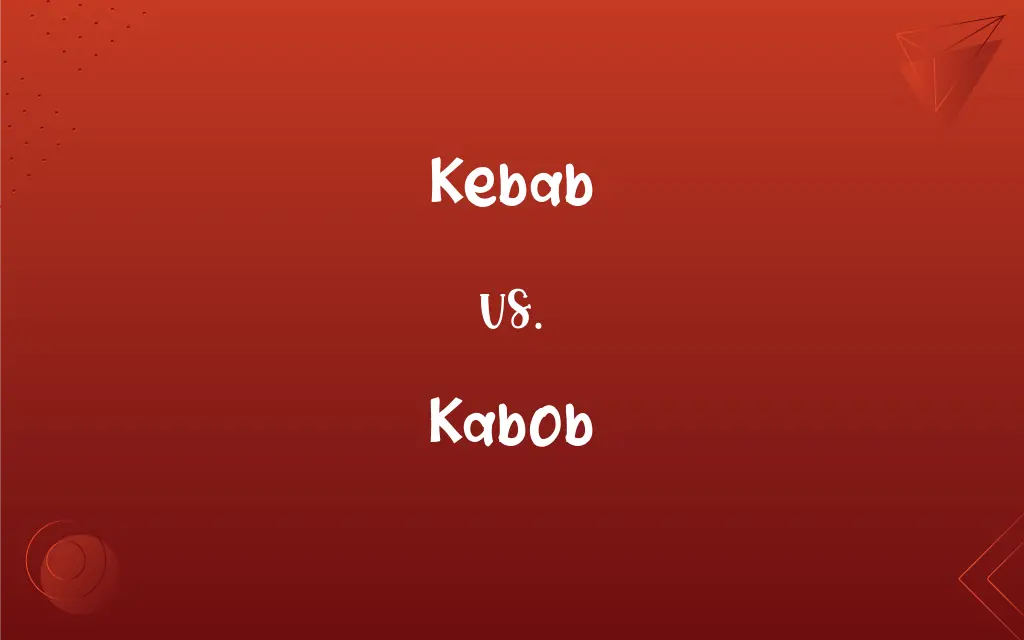Kebab vs. Kabob: What's the Difference?
Edited by Aimie Carlson || By Harlon Moss || Published on February 13, 2024
Kebab and kabob are variant spellings of the same dish, typically meat grilled on a skewer, originating from Middle Eastern cuisine.

Key Differences
Kebab, often used in British English, refers to various cooked meat dishes, especially those cooked on skewers. Kabob, more common in American English, denotes the same dish: skewered and grilled meats, often with vegetables.
The word "kebab" is derived from Arabic and Persian, symbolizing a wide range of meat dishes. "Kabob," while conveying the same meaning, reflects a phonetic adaptation in American English.
Kebab is associated with a variety of preparation styles, from the Turkish shish kebab to the Indian seekh kebab. Similarly, kabob includes many preparations, like the popular shish kabob in the United States.
Kebab is a term widely used in Europe and Asia, reflecting the dish's cultural origins. In contrast, kabob is more frequently used in American English, often appearing in restaurant menus and cookbooks in the USA.
Both kebab and kabob describe a dish that can be made with different meats, such as lamb, beef, or chicken. Regardless of the spelling, the cooking method typically involves grilling or roasting the meat.
ADVERTISEMENT
Comparison Chart
Spelling and Usage
Common in British English and Asia
More common in American English
Origin of the Term
From Arabic and Persian languages
American adaptation of the same word
Varieties
Includes shish kebab, seekh kebab, etc.
Includes varieties like shish kabob
Cultural Association
Reflects broader European and Asian usage
Associated with American cuisine
Cooking Method
Grilled or roasted meat on skewers
Same cooking method: grilling or roasting
ADVERTISEMENT
Kebab and Kabob Definitions
Kebab
A variety of meat dishes originating from Middle Eastern cuisine.
Chicken kebab is my favorite dish at the barbecue.
Kabob
A culinary term for meat cooked on a stick, often with vegetables.
She loves making vegetable and beef kabobs for parties.
Kebab
Grilled meat, often served on a skewer.
We had delicious lamb kebabs at the Middle Eastern restaurant.
Kabob
Skewered and grilled meat, commonly used in American English.
We made chicken kabobs on the grill last night.
Kebab
A dish often found in Turkish and Indian cuisine.
The restaurant specializes in traditional Turkish kebabs.
Kabob
A skewered meat preparation popular in American cuisine.
Lamb kabobs are a tasty and easy-to-make dinner option.
Kebab
Meat, sometimes with vegetables, cooked on a skewer.
For our picnic, we prepared beef kebabs.
Kabob
American term for Middle Eastern skewered meat dishes.
Shish kabob is a popular item at the local food festival.
Kebab
Cooked skewered meat, often served with sauces.
The street vendor offered spicy sauces with his kebabs.
Kabob
Grilled meat dish, reflecting American adaptation of kebab.
The kabobs were a hit at the Fourth of July barbecue.
Kebab
Shish kebab.
Kabob
Variant of kebab.
Kebab
(British) A dish of pieces of meat, fish, or vegetables roasted on a skewer or spit, especially a doner kebab.
Kabob
Alternative spelling of kebab
Kabob
Alternative spelling of kebab
Kabob
Cubes of meat marinated and cooked on a skewer usually with vegetables
FAQs
What is a kebab?
A kebab is a dish of pieces of meat, fish, or vegetables roasted or grilled on a skewer or spit.
Is there a difference in preparation between kebab and kabob?
No, the preparation is the same; the difference is only in spelling.
How are kebabs traditionally cooked?
Traditionally, they are grilled over open flames.
What is a kabob?
"Kabob" is an alternate spelling of "kebab", primarily used in North American English.
Are kebab and kabob the same?
Yes, they refer to the same dish but are different spellings.
Can kebabs be vegetarian?
Yes, vegetarian kebabs can be made with vegetables or paneer.
What is the most popular kebab?
The popularity varies by region, but shish kebab and doner kebab are widely known.
What meats are commonly used in kebabs?
Common meats include lamb, beef, chicken, and fish.
Where does the word kebab come from?
The word kebab is of Middle Eastern origin, possibly derived from Arabic or Persian.
Is kebab considered a healthy food?
It can be healthy, especially when made with lean meat and vegetables, but it depends on the preparation.
What is the difference between shish kebab and doner kebab?
Shish kebab is skewered and grilled meat, while doner kebab is meat cooked on a vertical rotisserie.
What are common types of kebabs?
Common types include shish kebab, doner kebab, and seekh kebab.
Can kebabs be baked?
Yes, though traditionally grilled, they can also be baked.
Are kebabs served with sauces?
Yes, they are often served with various sauces like yogurt, tahini, or garlic sauce.
What is a vegetarian alternative for kebabs?
Vegetables, tofu, or paneer are popular vegetarian options.
Can kebabs be part of a diet plan?
Yes, when prepared with lean meats and vegetables, they can fit into a healthy diet.
What are common spices used in kebabs?
Spices like cumin, paprika, garlic, and coriander are commonly used.
Is kebab a fast food?
In some forms like doner kebab, it is considered fast food, but it can also be a gourmet dish.
How do you pronounce "kebab" and "kabob"?
"Kebab" is pronounced as keh-bab, and "kabob" is pronounced as kuh-bob.
Which countries are famous for their kebabs?
Countries like Turkey, Iran, and India are famous for their kebabs.
About Author
Written by
Harlon MossHarlon is a seasoned quality moderator and accomplished content writer for Difference Wiki. An alumnus of the prestigious University of California, he earned his degree in Computer Science. Leveraging his academic background, Harlon brings a meticulous and informed perspective to his work, ensuring content accuracy and excellence.
Edited by
Aimie CarlsonAimie Carlson, holding a master's degree in English literature, is a fervent English language enthusiast. She lends her writing talents to Difference Wiki, a prominent website that specializes in comparisons, offering readers insightful analyses that both captivate and inform.






































































